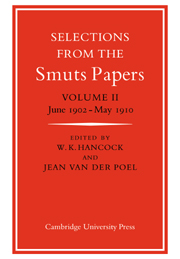Documents 339–477
Published online by Cambridge University Press: 03 February 2010
Summary
The papers of this period cast revealing flashes of light on the main historical issues in South Africa at that time and on the public tasks at which Smuts was then working. But they do not constitute a continuous record, for much of what Smuts wrote and did at this time was officially recorded and does not appear in his private papers. He was apparently too busy to write many private letters. Moreover, regular correspondents like Emily Hobhouse and Margaret Clark [Gillett] were in South Africa for part of the period and his letters to others, for example Wolstenholme, have almost all been lost. The best correspondence of these years is again that with Merriman.
In the Transvaal Government Smuts was Minister of Education and Colonial Secretary. In the first capacity his most notable achievement was an Education Act which aroused sharp criticism and had political consequences (344, 347, 349). In the second capacity he was confronted by the intractable Indian problem (359–361, 365–367, 369, 406, 441).
The most important papers are those on the activities that brought about the political union of the four South African colonies, and this is the main theme of the letters exchanged between the two men who were the pre-eminent makers of the Union—Smuts and Merriman. Steyn, de Villiers and others make contributions to the private debate.
- Type
- Chapter
- Information
- Selections from the Smuts Papers , pp. 331 - 642Publisher: Cambridge University PressPrint publication year: 1966



